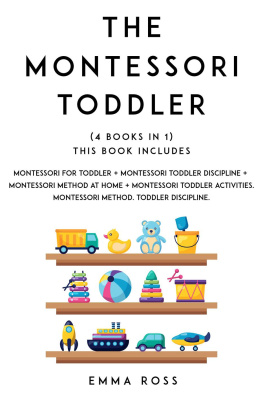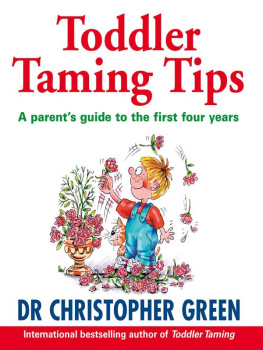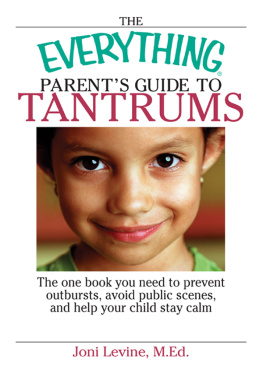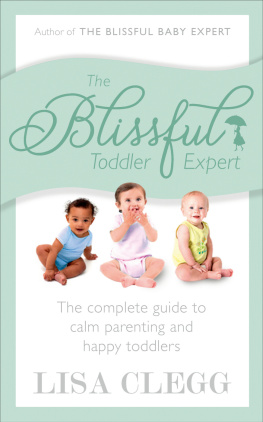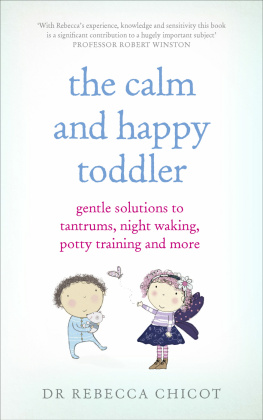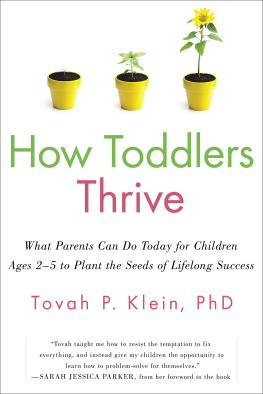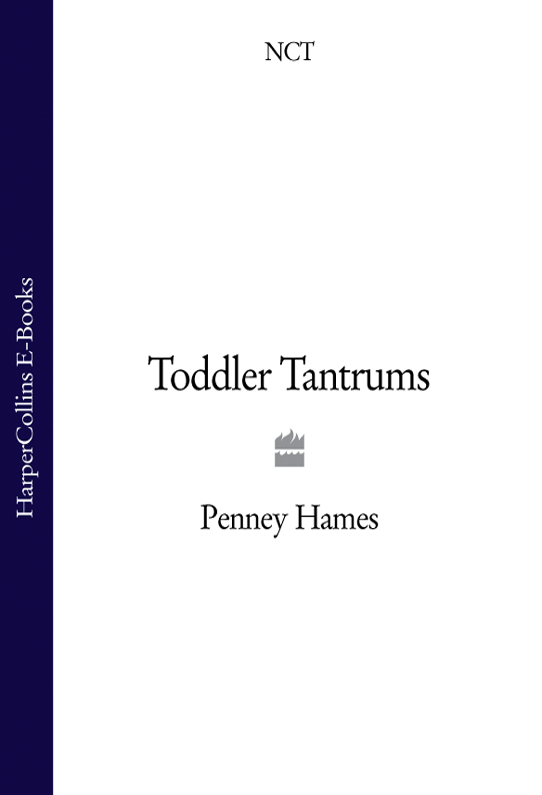

Toddler Tantrums
Penney Hames

To Jane Cleaver, with thanks for
all the shades between black and white
To laugh often and much; to win the respect of intelligent people and the affection of children; to earn the appreciation of honest critics and endure the betrayal of false friends; to appreciate beauty; to find the best in others; to leave the world a bit better, whether by a healthy child, a garden, or a redeemed social condition; to know even one life has breathed easier because you have lived. This is to have succeeded.
Ralph Waldo Emerson
Contents

A few days ago, I finally looked squarely at something that had been loitering around the edges of my mind for a very long time maybe since I was a toddler. Why, I wondered, did I find the relationships between parents and children particularly small children and their new and largely wobbly parents so endlessly fascinating?
I think its because I recognize in the toddler parent relationship a stronger thread of the same uncertainty and repositioning that has woven through my own relationships, not just with my own children, but with my parents and my sisters too.
Toddlers are people in the making and the parents of toddlers are, at the same time, parents in the making. The two processes are irrevocably entwined. New parents with a baby are rapidly learning the basics, but not until they hit toddlerhood do most parents seriously begin to doubt their parenting ability. Its an unsettling time, but this questioning has its virtues. Its not until you question who you are that you can grow up a little. Jostling with our toddlers for space in the family may feel chaotic and uncomfortable, but it gives us the chance to redefine and to deepen our relationship with them and to come to understand ourselves better in the process.
But we dont just create ourselves as parents through our relationships with our toddlers. In becoming the sort of parents we feel good about being, we become more aware of the similarities and differences that we want to make between our own parents and ourselves. In the toddler years, we establish all sorts of limits and boundaries across three generations. And feeling comfortable with this takes time.
Many of the characteristics our toddlers develop and much of our own parenting styles seem to have their roots in the toddler years. In learning to say no firmly but lovingly, and feel good about it, we create space between ourselves and our toddlers that allows them room to flourish in their own way. And leaves us space to develop in ours.
Penney Hames
1
What is a Tantrum?
Three-year-old Ruby is standing in the supermarket, her arms locked in position like an angel in a Christmas play, out to her sides, her legs rigid, her eyes wide open and she is screaming. Its a high-pitched, ear-piercing, heart-stopping, agony of a scream. Her mother, hovering nearby, is trying to coax her to come on. Everyone is looking, and even Rubys mums friend is shifting uneasily from foot to foot and whispering advice. In the end, Rubys mum becomes cross and yells at Ruby to Stop it immediately. But Ruby goes on screaming, and by now her face is white, with a blue tinge. Rubys mum is embarrassed, angry and her bottom lip is quivering. Finally, she picks Ruby up (no mean feat given the rigidity of her daughters young body) and, abandoning her trolley full of defrosting fish fingers and ice cream in the middle of the aisle, carts her daughter, still screaming, from the supermarket and bundles her into her car seat. Rubys mum starts the engine and crunches into reverse and away, she doesnt know where, just away. After 15 minutes, Ruby finally stops screaming and falls asleep. Her mother is exhausted, confused and the first of many tears runs down her cheek.
A tantrum is a supercharged emotional explosion that occurs when your toddler feels out of control. Its a practical demonstration of how your toddler feels inside chaotic, confused and in pieces. Almost all tantrums happen when your toddler is with the people that she loves the most which probably means you. But then you knew it was tough being a parent.
But tantrums are more than just shows of temper. Temper may be how it looks to you. In a temper may be how it makes you feel. But if you think of them as temper tantrums, and nothing more, you are not only doing your toddler a disservice, but you may also waste one of the most valuable opportunities you will ever have for helping your toddler come to terms with strong emotions.
In one sense, tantrums are natural, frequent and, believe it or not, positive steps forward in your childs development. Tantrums prove that your toddler is beginning to develop a sense of herself, and a sense of her place in the world. Throwing a tantrum is your toddlers way of coping with the frustration that she feels when she cant hang on any longer to her fragile sense of who she is, and how she fits in.
Toddlers begin to learn where they end and others begin in two ways:
by doing things
through their relationship with you
Busy Doing Nothing
Toddlers are busy people for good reason. A toddlers sense of herself is bound up with doing things. When you are two or three, activity is the best way to work out who you are pretending, digging, incessantly chatting, taking things apart, running, climbing, sorting, shouting all are activities that provide your toddler with a firmer sense of herself.
Its by doing that toddlers discover their strengths and weaknesses. And its by choosing what they do (within limits) that toddlers discover their likes and dislikes they discover themselves. Toddlers need plenty to do and lots of (limited) choice.
If you have to say no to your toddler, offer him two other choices, so that he can still feel in control. Choices give your toddler the chance to escape with dignity.
Two-year-old Charlie began to stroke Jonathans curls with a wooden hammer, but Mike, Charlies dad, stepped in before Charlie thought of another use for his toy. Here Charlie, lets swop, he said. Which would you prefer this comb or this little red brush? Charlie happily dropped the hammer.
But toddlers arent able to limit what they want, at least not at first. A young toddlers only concern is to do what she wants and to do it NOW. So, when you say no to your toddler, or even ask her to wait, she doesnt have the brainpower to coolly consider your point of view she doesnt even yet realize you have a point of view. All she feels is confused and incredibly frustrated.
Toddlers are spontaneous individuals for whom a second is a long time and a minute an impossibility. For toddlers there is only now. They cant think about later. They cant imagine five minutes time, let alone tomorrow afternoon. Your toddlers frustration is born out of a desire to do whatever it is she has in mind immediately.
Frustration generates a lot of tension which has to be expressed somehow, and hurling yourself to the floor, thrashing wildly and screaming as loud as you can is a magnificent way of releasing that tension immediately.
Next page

